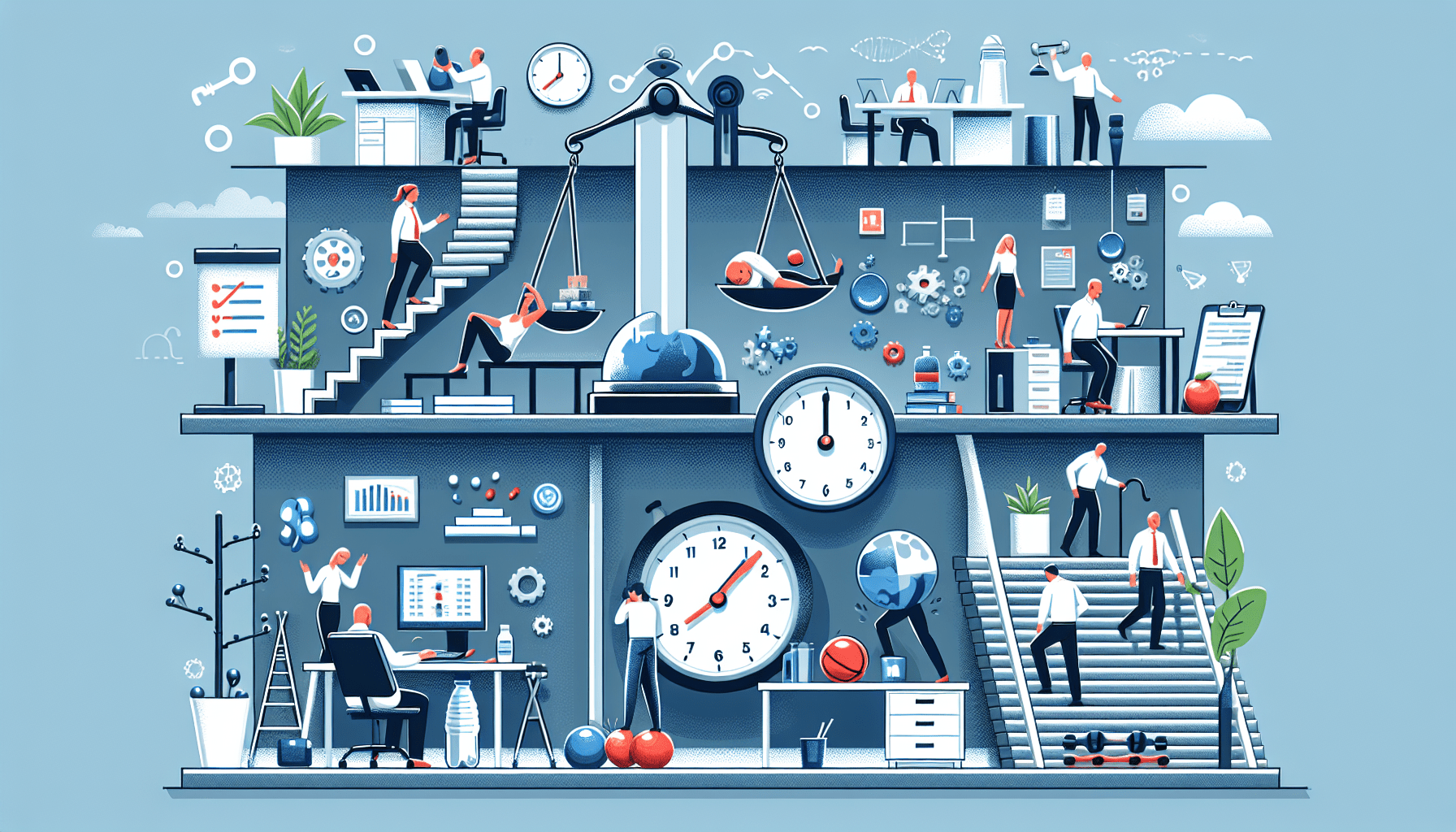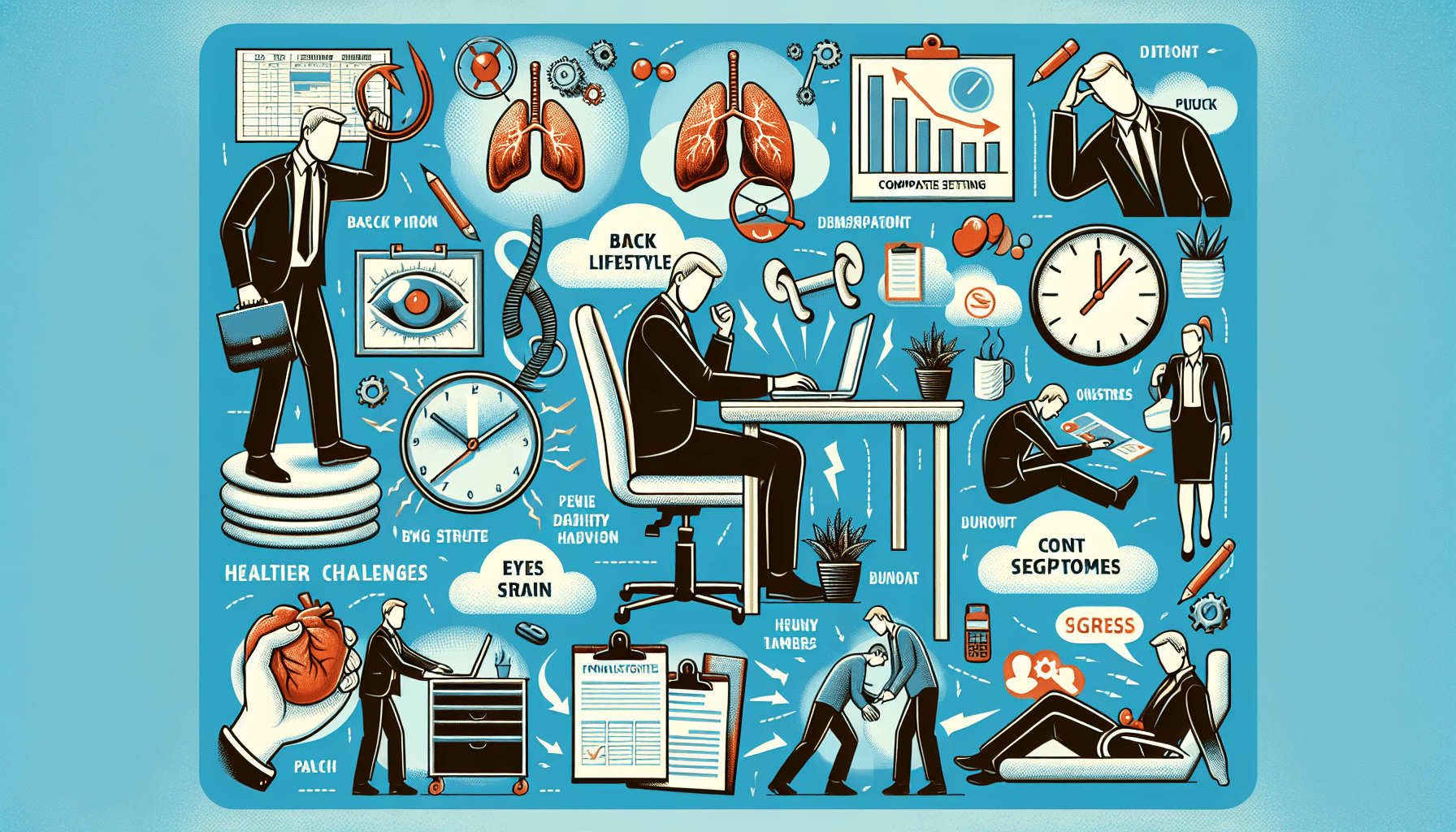Working can be a challenging experience, especially when it comes to our health. From long hours spent sitting at a desk to high levels of stress, our well-being can easily become compromised. In this article, we will explore the various health challenges that individuals face in the workplace and discuss effective strategies to overcome them. So, whether you are seeking ways to improve your work-life balance or looking for tips to boost your overall health, this article is here to help you navigate the hurdles and optimize your well-being in the professional sphere.

Physical Health Challenges
Sedentary Lifestyle
A sedentary lifestyle is a significant physical health challenge faced by many individuals in the workplace. Spending long hours sitting at a desk or in front of a computer can lead to various health issues, including obesity, cardiovascular diseases, and musculoskeletal problems. It’s important to find ways to incorporate more movement into your daily routine, such as taking short breaks to stretch or walking around the office whenever possible.
Poor Ergonomics
Another physical health challenge often encountered in the workplace is poor ergonomics. Inadequate office furniture, such as uncomfortable chairs or improperly positioned desks, can lead to back and neck pain, as well as repetitive strain injuries. It is crucial to ensure that your workspace is properly set up to support good posture and prevent strain on your body. Adjusting the height of your chair and monitor, using an ergonomic keyboard and mouse, and incorporating other ergonomic measures can greatly improve your working environment.
Inadequate Breaks
Taking regular breaks throughout the workday is essential for maintaining good physical health. Unfortunately, many employees fail to prioritize and utilize their break time effectively. Whether it’s because of a heavy workload or a sense of guilt associated with taking breaks, working long hours without sufficient rest can lead to fatigue, decreased productivity, and increased risks of physical health problems. It is crucial to schedule and take short breaks during the day, giving your body a chance to rest and recharge.
Work-related Injuries
In certain industries, work-related injuries are a prevalent physical health challenge. Jobs that involve manual labor or operating heavy machinery can put individuals at a higher risk of accidents and injuries. It is crucial to follow all safety protocols and guidelines provided by your employer, such as wearing the appropriate safety equipment and reporting any safety hazards promptly. Regular training sessions and awareness programs can also contribute to reducing work-related injuries and promoting a safer work environment.
Mental Health Challenges
High Stress Levels
High levels of workplace stress can significantly impact an individual’s mental health. Constant pressure to meet deadlines, handle increasing workloads, and manage demanding tasks can lead to heightened stress levels. Prolonged exposure to stress can result in anxiety, depression, and even physical health problems. Implementing stress management techniques, such as practicing mindfulness, prioritizing tasks, and seeking support from colleagues or professional counselors, can help mitigate the negative effects of stress on mental well-being.
Workplace Bullying
Workplace bullying can have severe consequences on an employee’s mental health. Whether it manifests as verbal abuse, intimidation, or exclusion, experiencing bullying in the workplace can lead to feelings of anxiety, depression, and low self-esteem. Employers must foster a respectful and inclusive work culture, providing resources and training to address and prevent workplace bullying. If you’re facing bullying, it’s important to speak up and seek support from supervisors or the human resources department.
Lack of Work-life Balance
Maintaining a healthy work-life balance is crucial for overall mental well-being. Unbalanced work-life commitments, such as working long hours, taking work home, or constantly being connected to work through technology, can lead to increased stress and decreased satisfaction in personal life. It is important to set boundaries and prioritize self-care by scheduling time for activities outside of work, engaging in hobbies, and spending quality time with family and friends. Employers should also encourage work-life balance by implementing policies that respect employees’ personal time and promote flexibility.
Burnout
Burnout is a state of emotional, physical, and mental exhaustion caused by chronic stress in the workplace. It can lead to decreased productivity, increased absenteeism, and negative impacts on both physical and mental health. To prevent burnout, it is essential to recognize and address early signs, such as chronic fatigue, reduced motivation, and feelings of cynicism towards work. Engaging in activities that help recharge and relax, seeking support from loved ones or professional counselors, and practicing self-care are crucial in combating and preventing burnout.
Unhealthy Eating Habits
Limited Food Choices
In the workplace, limited access to healthy food options can contribute to unhealthy eating habits. Fast-food restaurants and vending machines offering sugary snacks and high-calorie meals are often more readily available than nutritious options. Consuming a diet high in processed foods, refined sugars, and unhealthy fats can lead to weight gain, increased risk of chronic diseases, and reduced overall well-being. Bringing your own healthy meals or snacks from home, planning ahead, and advocating for healthier food choices in the workplace can help overcome this challenge.
Skipping Meals
Skipping meals due to a busy work schedule or a lack of time can have detrimental effects on your health. Regularly skipping meals can disrupt your metabolic rate, lead to unstable blood sugar levels, and cause deficiencies in important nutrients. To avoid this, prioritize regular meal breaks and plan your meals in advance. Bringing portable and nutritious snacks to work can also help you maintain a balanced diet even on busy days.
Overdependence on Junk Food
The convenience and availability of junk food in the workplace can lead to overdependence on these unhealthy options. Regular consumption of sugary drinks, snacks high in saturated fats, and processed foods can contribute to weight gain, fatigue, and overall decline in health. By consciously making healthier food choices, such as opting for fruits and vegetables, whole grains, and lean proteins, you can improve your nutrition and energy levels in the workplace.
Irregular Eating Patterns
Irregular eating patterns, such as skipping breakfast or eating late at night, can disrupt your body’s natural rhythm and impact your digestion and energy levels. It is important to establish a routine that includes regular meals and snacks throughout the day. This can help stabilize your blood sugar levels, provide a steady source of energy, and support overall physical and mental well-being.
Lack of Physical Activity
Long Hours of Sitting
Many professions require prolonged periods of sitting, which can have detrimental effects on physical health. Sedentary behavior can lead to weight gain, muscle weakness, and increased risk of chronic diseases. Finding opportunities to incorporate movement into your workday, such as taking short walks during breaks or using standing desks, can help combat the negative impacts of long hours of sitting.
Minimal Exercise Opportunities
Some work environments may offer limited opportunities for exercise, such as jobs that require continuous desk work or minimal physical movement. Lack of exercise can lead to decreased cardiovascular fitness, muscle weakness, and increased risk of chronic diseases. It is important to proactively prioritize exercise outside of work hours, such as engaging in regular physical activity, joining a gym, or participating in recreational sports.
Neglecting Fitness
Neglecting fitness due to work commitments can negatively impact your physical well-being. Regular exercise plays a crucial role in maintaining cardiovascular health, muscle strength, and overall fitness. It is essential to prioritize and schedule physical activity into your routine, even if it means starting with small achievable goals. Exercise not only improves your physical health but also positively impacts your mental well-being.
Reduced Stamina
A lack of physical activity at work can gradually lead to reduced stamina and endurance. Tasks that were once manageable may become more challenging, and overall energy levels may decline. By incorporating regular aerobic exercise, strength training, and flexibility exercises into your routine, you can increase your stamina and improve your ability to perform physical tasks both at work and in your personal life.

Sleep Issues
Insomnia
Insomnia, or difficulty falling asleep or staying asleep, can have a significant impact on your health and well-being. Work-related stress, irregular schedules, or an uncomfortable work environment can contribute to insomnia. Establishing a bedtime routine, creating a sleep-friendly environment, and practicing relaxation techniques can help improve your sleep quality and combat insomnia.
Irregular Sleeping Patterns
Inconsistent sleeping patterns can disrupt your body’s natural circadian rhythm and impact the quality of your sleep. Shift work, irregular working hours, or jet lag can significantly affect your sleep patterns. Establishing a consistent sleep schedule, even on weekends, can help regulate your body’s internal clock and promote better sleep.
Sleep Deprivation
Lack of sufficient sleep can lead to a range of health problems, including impaired cognitive function, decreased productivity, and increased risk of accidents. It is crucial to prioritize sleep and ensure you are getting the recommended 7-9 hours of quality sleep each night. Creating a sleep-friendly environment, practicing good sleep hygiene, and managing stress effectively are important steps in combating sleep deprivation.
Work-related Stress Affecting Sleep
High levels of work-related stress can significantly impact your ability to sleep well. Racing thoughts, worry, and anxiety can make it difficult to relax and fall asleep. Establishing a work-life balance, implementing stress management techniques, and seeking support when necessary can help alleviate work-related stress and improve sleep quality.
Substance Abuse
Increased Alcohol Consumption
Work-related stress and pressures can sometimes lead individuals to cope by increasing alcohol consumption. Excessive drinking can have severe health consequences, including liver damage, increased risk of accidents, and impaired cognitive function. It is important to recognize the signs of alcohol dependency and seek professional help when necessary. Employers should promote a supportive work environment that encourages healthy coping mechanisms and provides resources for employees facing substance abuse.
Drug Dependency
In some cases, work-related stress and challenges may lead individuals to turn to drugs as a means of coping. Substance abuse can have devastating effects on physical and mental health, as well as work performance. If you or someone you know is struggling with drug dependency, seeking assistance from healthcare professionals and support groups is vital.
Self-Medication for Stress Relief
Individuals facing high levels of stress may turn to self-medication as a means of temporary relief. This can involve the misuse of prescription or over-the-counter drugs, which can have detrimental effects on health and well-being. It is essential to seek healthier coping mechanisms, such as exercise, relaxation techniques, and seeking professional help when needed.
Adverse Effects on Health and Performance
Substance abuse not only affects an individual’s physical and mental health but also their work performance. Impaired cognitive function, decreased productivity, and increased absenteeism are among the consequences of substance abuse. Encouraging a supportive work environment, providing resources for addiction counseling, and implementing programs that promote overall well-being are crucial in addressing this challenge.

Lack of Workplace Safety
Exposure to Harmful Substances
Certain workplaces expose employees to harmful substances, such as chemicals, fumes, or radiation, which can have serious health implications. Employers should prioritize safety measures, including providing personal protective equipment, implementing proper ventilation systems, and offering training on handling and disposing of hazardous substances. Regular inspections and risk assessments should be conducted to minimize employees’ exposure to harmful substances.
Inadequate Protective Measures
A lack of adequate protective measures in the workplace can increase the risk of accidents and injuries. Employers should ensure that safety protocols and guidelines are in place and strictly followed. This includes providing safety equipment, implementing emergency response procedures, and promoting a safety-conscious culture.
Risk of Accidents and Injuries
Workplaces that involve manual labor or operate heavy machinery come with inherent risks of accidents and injuries. Employers must prioritize safety training, risk assessments, and regular equipment maintenance to minimize the risk of accidents. Reporting and addressing any safety concerns promptly is crucial to maintaining a safe work environment.
Occupational Hazards
Different industries are associated with specific occupational hazards, such as exposure to loud noise, repetitive movements, or heavy lifting. Employers should prioritize identifying and controlling these hazards through measures such as noise reduction, ergonomic practices, and the implementation of automated machinery. Regular health and safety audits can help identify potential hazards and ensure the necessary precautions are in place.
Poor Work Environment
Unhealthy Air Quality
Poor air quality in the workplace can have detrimental effects on employees’ health. Air pollution from various sources, such as chemical fumes, dust, or mold, can contribute to respiratory problems, allergies, and other health conditions. Adequate ventilation, proper air filtration systems, and regular cleaning and maintenance are necessary to ensure a healthy work environment.
Inadequate Lighting
Insufficient or inappropriate lighting in the workplace can lead to eye strain, headaches, and decreased productivity. Proper lighting, including natural light when possible, should be provided to ensure a comfortable and well-lit work environment. Regular maintenance of lighting systems is essential to ensure optimal functioning.
Inefficient Temperature Control
Extreme temperatures in the workplace can negatively impact employee comfort and well-being. Workplace environments that are too hot or too cold can lead to discomfort, decreased productivity, and potential health issues. Employers should strive to maintain a comfortable temperature through proper insulation, climate control systems, and regular monitoring of temperatures.
Noise Pollution
Excessive noise in the workplace can be disruptive and detrimental to employees’ mental and physical well-being. Prolonged exposure to loud noise can lead to hearing problems, increased stress levels, and reduced concentration. Implementing measures to reduce noise levels, such as soundproofing or providing noise-canceling headphones, can help create a more peaceful and productive work environment.

Lack of Employee Support
Insufficient Health Resources
When employees face health challenges, having access to sufficient health resources is crucial. This can include on-site health clinics, access to healthcare professionals, and health education programs. Employers should invest in providing comprehensive health resources to support their employees’ physical and mental well-being.
Limited Access to Healthcare
In some cases, employees may face limited access to healthcare, whether due to financial constraints or lack of health insurance coverage. Employers can play a role in addressing this challenge by offering comprehensive health insurance plans, providing information about available healthcare resources, or partnering with local clinics or hospitals to ensure employees have access to necessary healthcare services.
Lack of Counseling or Mental Health Support
Mental health support is essential for employees facing mental health challenges. Unfortunately, many workplaces lack counseling services or resources to address mental health issues effectively. Employers should prioritize offering mental health programs, employee assistance programs, or access to professional counselors to address this challenge and support employee mental well-being.
Inadequate Work-life Balance Policies
A lack of work-life balance policies can contribute to increased stress levels and decreased overall well-being. Employers should implement policies that promote work-life balance, such as flexible work hours, telecommuting options, or generous vacation and leave policies. These policies not only support employees’ well-being but also contribute to increased productivity and job satisfaction.
Importance of Addressing Health Challenges
Enhancing Employee Productivity
Addressing health challenges in the workplace can significantly enhance employee productivity. By promoting physical and mental well-being, employers create an environment where employees can thrive and perform at their best. Reduced absenteeism, increased engagement, and higher job satisfaction are among the positive outcomes of a healthier workforce.
Reducing Absenteeism
Health challenges can often result in increased absenteeism, further impacting work performance and productivity. By addressing these challenges and prioritizing employee health, employers can help reduce absenteeism and create a more stable and efficient work environment.
Improving Job Satisfaction
Investing in employee health and well-being contributes to increased job satisfaction. When employees feel supported and valued in their workplace, they are more likely to be satisfied with their job, leading to higher retention rates and overall better morale.
Promoting Overall Well-being
Ultimately, addressing health challenges at work is crucial for promoting overall well-being. A healthy workforce not only benefits individuals on a personal level but also contributes to the success and sustainability of the organization as a whole. By prioritizing physical and mental health in the workplace, employers foster a culture of well-being and create an environment that supports employees’ holistic development.
In conclusion, physical health challenges, mental health challenges, unhealthy eating habits, lack of physical activity, sleep issues, substance abuse, lack of workplace safety, poor work environment, and lack of employee support are critical health challenges faced by individuals in the workplace. Addressing these challenges is of utmost importance as it enhances employee productivity, reduces absenteeism, improves job satisfaction, and promotes overall well-being. Employers should strive to create a supportive work environment that prioritizes employee health and well-being through implementing appropriate policies, providing resources, and fostering a culture of care.

